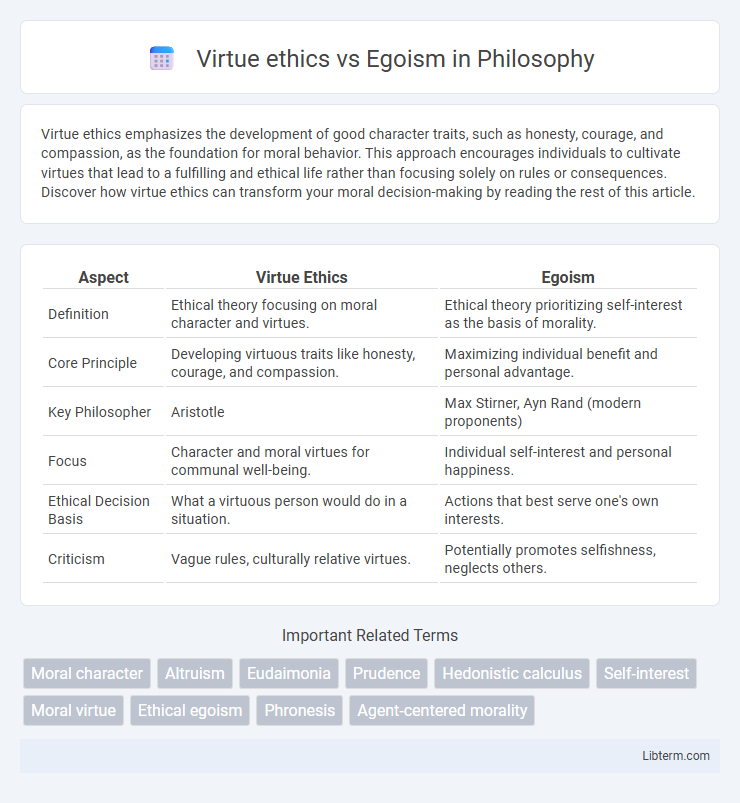Virtue ethics emphasizes the development of good character traits, such as honesty, courage, and compassion, as the foundation for moral behavior. This approach encourages individuals to cultivate virtues that lead to a fulfilling and ethical life rather than focusing solely on rules or consequences. Discover how virtue ethics can transform your moral decision-making by reading the rest of this article.
Table of Comparison
| Aspect | Virtue Ethics | Egoism |
|---|---|---|
| Definition | Ethical theory focusing on moral character and virtues. | Ethical theory prioritizing self-interest as the basis of morality. |
| Core Principle | Developing virtuous traits like honesty, courage, and compassion. | Maximizing individual benefit and personal advantage. |
| Key Philosopher | Aristotle | Max Stirner, Ayn Rand (modern proponents) |
| Focus | Character and moral virtues for communal well-being. | Individual self-interest and personal happiness. |
| Ethical Decision Basis | What a virtuous person would do in a situation. | Actions that best serve one's own interests. |
| Criticism | Vague rules, culturally relative virtues. | Potentially promotes selfishness, neglects others. |
Understanding Virtue Ethics: Foundations and Principles
Virtue ethics emphasizes character development and moral virtues such as courage, honesty, and compassion as the foundation for ethical behavior, contrasting with egoism's focus on self-interest as the primary moral guide. Rooted in Aristotelian philosophy, virtue ethics promotes achieving eudaimonia, or human flourishing, through habitual practice of virtuous traits. This ethical framework prioritizes the cultivation of good character over the calculation of consequences or adherence to rules, fostering moral excellence and social harmony.
Core Tenets of Egoism: An Overview
Egoism centers on the principle that individuals should act in their own self-interest to achieve personal happiness and success, emphasizing rational decision-making that benefits the self. Unlike virtue ethics, which prioritizes moral virtues and character development for the common good, egoism defines ethical behavior based on outcomes that maximize individual advantage. Psychological egoism asserts that humans are inherently motivated by self-interest, while ethical egoism prescribes that people ought to pursue actions that serve their own well-being.
Historical Roots: Virtue Ethics and Egoism Compared
Virtue ethics, rooted in ancient Greek philosophy, particularly Aristotle's Nicomachean Ethics, emphasizes character development and moral virtues as central to ethical behavior. Egoism, with historical ties to thinkers like Thomas Hobbes and later psychological egoists, asserts that self-interest is the foundation of all human actions and moral decisions. While virtue ethics prioritizes cultivating virtues such as courage and temperance, egoism centers on maximizing individual benefit, highlighting a fundamental divergence in their philosophical origins and ethical focus.
Defining Moral Character: Virtue Ethics Perspective
Virtue ethics defines moral character through the cultivation of virtues such as courage, honesty, and compassion, emphasizing the development of a stable and admirable character rather than isolated actions. This perspective suggests that a morally good person consistently exhibits virtuous traits, shaping behavior through habitual practice and rational reflection. Unlike egoism, which centers on self-interest as the basis for morality, virtue ethics prioritizes the flourishing of both the individual and community through morally exemplary character.
Self-Interest as a Moral Guide: The Egoist View
Egoism posits self-interest as the paramount moral guide, asserting that individuals should act to maximize their own well-being and happiness. Unlike virtue ethics, which emphasizes character and moral virtues cultivated over time, egoism prioritizes personal gain and rational self-benefit in ethical decision-making. This perspective holds that moral actions are those that serve the individual's long-term interests, asserting that ethical behavior inherently aligns with self-preservation and personal success.
Key Thinkers: Aristotle vs Ayn Rand
Aristotle's virtue ethics emphasizes character development and moral virtues such as courage, wisdom, and temperance to achieve eudaimonia, or human flourishing. Ayn Rand's egoism, specifically ethical egoism, advocates rational self-interest and individual rights as the foundation for morality, rejecting altruism. While Aristotle focuses on communal well-being and habituated virtues, Rand prioritizes individual autonomy and personal happiness.
Practical Applications: Decision Making in Daily Life
Virtue ethics emphasizes developing moral character traits like honesty and courage to guide daily decisions toward the common good, promoting long-term well-being and meaningful relationships. Egoism prioritizes actions that maximize individual self-interest and personal benefit, often influencing choices based on short-term gains and personal success. In practical decision making, virtue ethics encourages balanced, context-sensitive judgments, while egoism drives goal-oriented behaviors centered on individual advantage.
Critiques and Limitations of Virtue Ethics
Virtue ethics faces critiques for its lack of clear action-guidance compared to egoism's straightforward self-interest focus, making it difficult to resolve moral dilemmas. Its emphasis on character development can be seen as culturally relative and subjective, leading to inconsistencies across different societies and individuals. Critics argue virtue ethics may overlook specific consequences of actions, reducing its practicality in decision-making situations where egoism's emphasis on individual benefit provides clearer outcomes.
Challenges and Controversies in Egoism
Egoism faces significant challenges including criticisms of moral selfishness and conflicts with societal welfare, as it prioritizes individual self-interest often at the expense of others. The controversy surrounding egoism arises from its potential to justify unethical behavior when personal gains override collective good and ethical duties. Unlike virtue ethics, which emphasizes character and moral virtues, egoism's narrow focus on self-benefit raises questions about its compatibility with broader ethical principles ensuring fairness and justice.
Which Approach Serves Society Better?
Virtue ethics promotes societal well-being by encouraging individuals to cultivate moral character traits like empathy, honesty, and justice, which foster community cohesion and social trust. Egoism, centered on self-interest, can lead to short-term gains for individuals but often undermines collective welfare by prioritizing personal benefits over communal needs. Consequently, virtue ethics better serves society by aligning personal development with the common good and sustainable social harmony.
Virtue ethics Infographic

 libterm.com
libterm.com